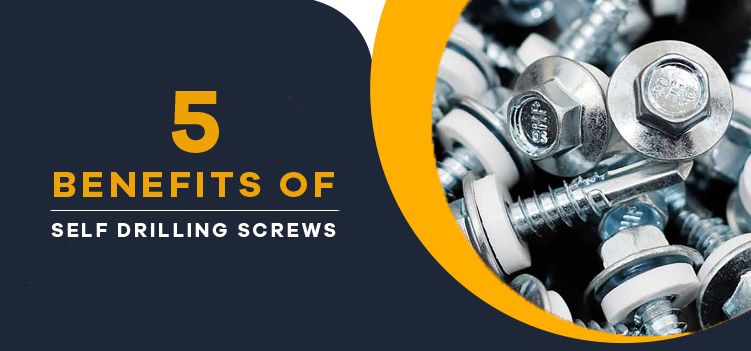What are Self Drilling Screws Used for?
Self drilling screws consist of a point that works as a drill bit with sharp cutting threads which tap holes while installing. These screws can quickly drill in every material, metal or wood.
Due to their notch, one can easily figure out self drilling screws from other screws. A pilot hole is not essential for these screws; they are versatile and can smoothly connect materials intensifying productivity and efficiency.
Due to their types and variations, one can use them in various construction and fabrication processes.
Self drilling screws have developed into a useful tool in manufacturing, fabrication, and production, from installing metal roofs to finishing assemblies.
These screws have points with curved ends that resemble twist drills. Light gauge applications require self drilling screws.
These have several advantages. During installation, these screws slightly tap the threads. It is a particular variety of self tapping screws with a drill point. This precise drill tip can create the mating threads and bore a hole simultaneously.
Types of Self Drilling Screws
- Cement Board Screws
- Bugle Head Screws
- Truss
- Hex Head
- Flat Head
- Eye Lag Screws
5 Benefits of Self Drilling Screws
Time-Saving
To cut and fasten these screws don’t require a plot hole. These screws can drill, tap, and fasten simultaneously. By following this, you can save time and avoid having to drill holes before securing things. The self drilling screws will reduce your stress, time, and resources with the ease that they provide.
Anti-corrosion
Daling with rusted screws is challenging. Rust makes metal structural elements less durable and causes the thickness of the elements to decrease. These screws are resistant to corrosion and keep from rusting. Hard or stainless steel that has undergone hardening treatment makes up these screws. As stainless steel does not get rusted, it is durable and free from corrosion. Since self drilling screws are constructed of durable, strong steel, they are each customer’s first preference.
Durability
The corrosion-resistant surface of them holds up better against the weakening effects of weathering. It increases the screw’s resilience and offers numerous other uses, making drilling easier. Additionally, these have extras that guard against corrosion.
Less Preparation
Screws that self-drill don’t require any form of pre-drilling or pre-fixing. Self-drilling offers an effective performance by cutting down on setup time and continuously ensuring an accurate and strong connection. Self drilling screws are intended to pierce or sever the material directly. By doing so, users can skip the pre-drilling stage and get an unbeatably tight thread.
Maximized Efficiency
Drilling into materials using self drilling screws requires the least amount of preparation. They are also a vital product of preference for goods that need to be installed or disassembled because of their accurate thread generated by the screw on its own. The screw ensures a solid and reliable binding since it always follows the same thread.
Uses of Self Drilling Screws
Roofing
The self-drilling for metal roofing (roofing screws) is specially created with a washer to provide a tight seal while fastening. These have a drill bit-shaped point, just like all self drilling screws, making insertion quick and simple.
Decking
Before creating such screws, construction workers had to drill pilot holes before putting in screws. Due to the removal of this unnecessary step, thanks to self drilling screws, jobs now take less time to complete, and the procedure is more effective. Compared to the pre-drill method, one can easily complete the entire process in less time.
Sheet Metal
Self drilling screws are used as fasteners to facilitate production and guarantee secure connections. Due to their manufacture and design, these screws can pierce 20-14 gauge metals. Due to their effectiveness, these screws are chosen over other types of fastening; construction, building, and furniture-making industries use it for metal fastening. Many different products have frames made of metal sheets.
Drywall
The countersunk head of self-drilling drywall screws, which precisely inserts into the drywall without ripping or harming the paper and prevents head pops, is a distinctive feature of these fasteners. They have rolling threads for enhanced strength and gripping power, are flexible enough to attach to metal or wood studs, and are flexible enough to be attached to both. They are available in numbers 6,7,8, and 10 diameters and are often quoted for interior uses.
Medical
Self-Drilling locking screws are employed in medicine for tissue and muscle repair, organ replacement, and orthopaedic surgery. Their use calls for a precise measurement of their length and confirmation of biomechanical stability. They are chosen over alternative fastening techniques in this application and others because they may insert quickly.
Conclusion
Self drilling screws are beneficial for fastening purposes and make the task easy. They are time-saving and work on almost every material from wood to metal.

